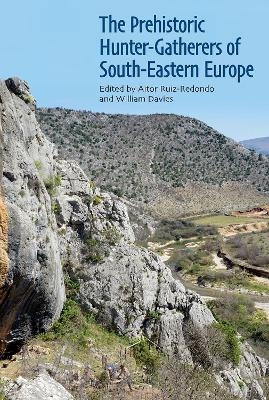
The Prehistoric Hunter-Gatherers of South-Eastern Europe
Oxford University Press (Verlag)
978-0-19-726750-9 (ISBN)
The Balkans can increasingly be seen as a key crossroads region, connecting the Near East with the rest of Europe. Such movements of ancient human foragers were not always from east to west; eastward dispersals into the Near East also occurred. The Balkans also served as an interaction zone, where encounters between incoming and indigenous human groups led to the exchange of ideas and genes. Recently increased intensity of study in the region has led to the discovery of genetic evidence for interbreeding (Neanderthals and modern humans), as well as rock art and possible early seafaring evidence.
Ruiz-Redondo and Davies set out new frameworks for future research. The Prehistoric Hunter-Gatherers of South-Eastern Europe is the first volume to evaluate the long hunter-gatherer prehistory of South-Eastern Europe, drawing together the latest evidence to restore this region to its full geographical and human evolutionary importance. This includes evidence of shifting raw material and subsistence economies, human remains and ancient DNA, and pre-Neolithic ceramics.
Aitor Ruiz-Redondo is a Senior Lecturer in Prehistory at the University of Zaragoza (Spain) and a British Academy Newton International alumnus. He obtained his PhD in Prehistory and Archaeology at the University of Cantabria (Spain) with a thesis about Palaeolithic graphic behaviour in South-western Europe. He later undertook postdoctoral positions at the Universities of Bordeaux (France), Southampton (UK), and Zaragoza (Spain), where his research has mainly been dedicated to the study of Upper Palaeolithic societies of Eastern Europe. He has led international research projects in Bosnia and Herzegovina, Croatia, Montenegro, Serbia, Spain, and UAE. Since 2020 he is vice-president of the UISPP 'Prehistoric art' world commission. William Davies is Professor of Palaeoanthropology at the University of Southampton (UK), and has developed strong research interests in the later European Palaeolithic (100,000-10,000 years ago) over the last 30 years. His research has focused on integrating palaeoanthropological, palaeoclimatic, and palaeoenvironmental datasets within robust chronological frameworks (Stage 3 Project, 1996-2002; S2AGES project, 2001-2004; EFCHED and RESET programmes, 2004-2013), as well as the characterisation of creativity and innovation in ceramic and other Palaeolithic technologies. He has lectured at the University of Southampton since 2006, and before then held post-doctoral research positions at the universities of Cambridge, Southampton, Oxford, and London.
List of Figures
List of Tables
Notes on Contributors
Preface // CLIVE GAMBLE
1: AITOR RUIZ-REDONDO and WILLIAM DAVIES: Introduction: current relevance and future potential of South-eastern Europe in Palaeolithic research
2: Dušan MIHAILOVIĆ: Lower Palaeolithic settlement of the Balkans: evidence from caves and open-air sites
3: MIRJANA ROKSANDIC, PREDRAG RADOVIĆ, JOSHUA LINDAL: The complex picture of the Middle Pleistocene hominin record at the crossroads of Europe and Asia
4: IVOR KARAVANIĆ and MARKO BANDA: The Middle Palaeolithic of South-Eastern Europe
5: ANA B. MARÍN-ARROYO, JENNIFER JONES, EMANUELA CRISTIANI, RHIANNON E. STEVENS, DU%SAN MIHAILOVI? AND BOJANA MIHAILOVI?: Late Pleistocene hominin settlement patterns in the Central Balkans: Šalitrena Pećina, Serbia
6: TSENKA TSANOVA: Preliminary comparison and chronology of the lithic blade and bladelet assemblages at the onset of the Upper Palaeolithic from Bacho Kiro, Temnata and Kozarnika caves in the Eastern Balkans (Bulgaria)
7: IVOR JANKOVIĆ AND FRED H. SMITH: Late Pleistocene human fossils from East-Central and South-Eastern Europe
8: NENA GALANIDOU AND CHRISTINA PAPOULIA: Between the Aegean and the Adriatic: The Balkan Palaeolithic and the Sea
9: NIKOLA VUKOSAVLJEVIĆ: Epigravettian in the Eastern Adriatic and its Hinterland: an overview of settlement dynamics, chronology, subsistence strategies and material culture
10: REBECCA FARBSTEIN: Lateglacial ceramic innovation and symbolism from the Balkans in its wider context
11: MARC VANDER LINDEN: Refugial foragers to invasive farmers: socio-environmental transitions during the Early Holocene in the Balkans
Index
| Erscheinungsdatum | 07.11.2023 |
|---|---|
| Reihe/Serie | Proceedings of the British Academy |
| Zusatzinfo | 71 figures |
| Verlagsort | Oxford |
| Sprache | englisch |
| Maße | 164 x 240 mm |
| Gewicht | 918 g |
| Themenwelt | Geisteswissenschaften ► Archäologie |
| Geschichte ► Allgemeine Geschichte ► Vor- und Frühgeschichte | |
| ISBN-10 | 0-19-726750-5 / 0197267505 |
| ISBN-13 | 978-0-19-726750-9 / 9780197267509 |
| Zustand | Neuware |
| Informationen gemäß Produktsicherheitsverordnung (GPSR) | |
| Haben Sie eine Frage zum Produkt? |
aus dem Bereich


